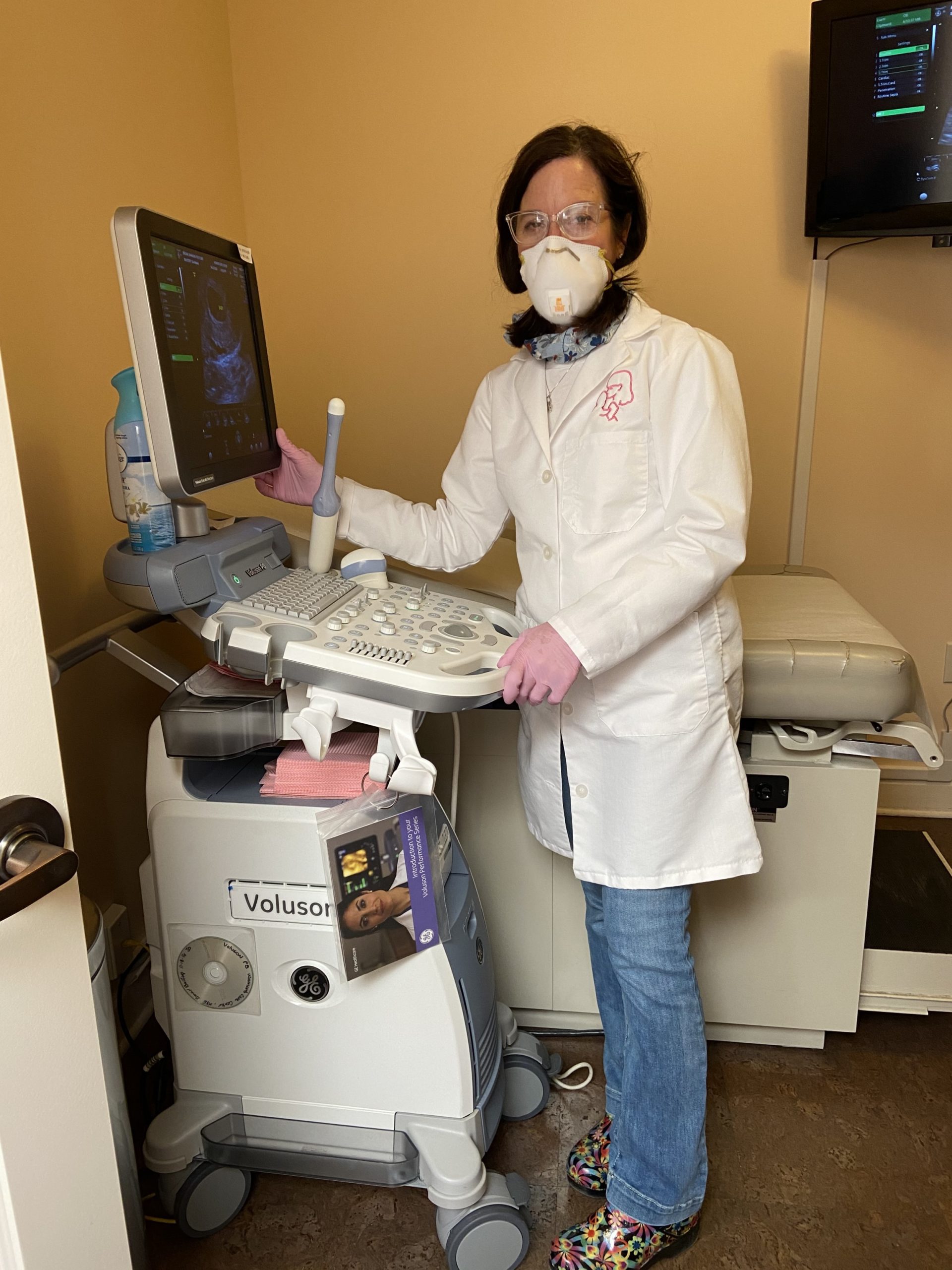Respect Life Month

Sheryl Laird, the executive director of the Women’s Care Center in Milwaukee, with an ultrasound machine. (Submitted photo)
Emotional and physical isolation. A sense of invisibility. A loss of fellowship. A feeling of uncertainty amidst a constantly changing social, political and economic landscape.
These have been the byproducts of the COVID-19 pandemic, and they are felt everywhere — but perhaps nowhere more than by women who are experiencing an unplanned pregnancy.
That’s why those who run crisis pregnancy centers believe their work has never been more important.
“What we all have to realize is that fear is what’s sending these women to the abortion mills. They think they have no options,” said Krys Crawley, executive director of Life’s Connection in Waukesha and Mukwonago.
Crawley said between its two offices, Life’s Connection is seeing 25 percent more clients than they normally would — and these are not just the stereotypical unmarried young women that many would think of when they imagine an abortion-minded mother. Many of these women, said Crawley, are in stable and loving relationships, but are terrified of the obstacles posed by the pandemic.
“They don’t see the baby at all — they just see crisis, and they feel helpless, and they can’t see past that uncertainty,” she said. “All they see is the obstacles that are ahead of them.”
Sheryl Laird, executive director of the Women’s Care Center in Milwaukee, said their two locations on North Farwell Avenue and Historic Mitchell Street are continuing to serve an average of 31 women a day, but are experiencing an increase in phone and email requests for help.
The clients that they do serve, she said, definitely feel the pressure of the pandemic.
“There is so much more fear and so much more uncertainty,” she said. “It’s an easy decision to go with that and just say, ‘Because of fear, because of uncertainty, I’m going to end this (and have an abortion).’ So, more than ever, it’s important that our doors are open and they can come to us. You can tell they’re just needing to know it’s going to be OK.”
Judy Fecteau, executive director of Milwaukee Birthright, said their organization has provided a slightly higher number of newborn layettes to needy families in the first seven months of 2020 — an increase of about 14 percent.
“I don’t think the increase has anything to do with the pandemic, as we do not provide a new baby layette until one month before the due date,” said Fecteau. “A more telling time frame will occur in November or December.”
Birthright’s offices have been closed since March 16 but the organization still operates a 24/7 phone line and now provides contactless doorstep delivery of needed items like diapers, newborn layettes and clothing up to size 4T. While volunteers have not reported an increase in requests for abortion information, said Fecteau, they have noticed an increase in requests for housing, information on jobs and food pantries, reflecting the increasing strain on families.
Crawley, Laird and Fecteau all said that they feel more motivated than ever to be a supportive and reassuring presence in the lives of the mothers and fathers they serve.
“It’s kind of a scary world right now. We don’t know when this is going to end. Is the vaccine going to come, and is that going to help us? There are just so many unknowns. People are living in a lot of uncertainty,” said Laird. “We’ve always been and we will always continue to be the voice of certainty in spreading the Gospel message — we’ve got you, God has you, you’re wrapped in his care through our love, our arms, our support, and it will be OK.”
Women’s Care Center has remained open for appointments and walk-ins. Laird said many of their clients have reported job loss and loss of health insurance, making their need for free early ultrasounds provided by Women’s Care Center even more important. The center’s parenting classes have been moved to YouTube, which has actually alleviated some transportation issues their clients previously experienced and allowed fathers at home to be more present in the process than ever before.
The center has also increasingly served as a clearinghouse for referrals for safety shelters, said Laird. “That’s what we really see a big, growing need in,” she said.
At the very onset of the pandemic, Life’s Connection was faced with the dilemma of how to continue seeing walk-in clients safely. Just a few hundred feet from the local Planned Parenthood, they wanted to make sure they were able to offer an alternative to mothers experiencing crisis. But, thanks to a particularly difficult cold and flu season, they had already stocked up on disinfectant and personal protective equipment before the pandemic arrived and depleted national supplies. “We never skipped a beat,” said Crawley.
Life’s Connection has also continued its practice of walking with a family through their parenting journey, moving meetings and parenting classes to Zoom. The pandemic provided a unique opportunity to grow in relationship with their client families, said Crawley.
“They were home with all their kids, and they were scared. We did a lot of praying with them, which was so cool,” she said. “They just wanted to be able to talk to somebody. They needed us more than ever.”
How to help:
Non-profit organizations who serve families in crisis are under increasing financial strain as their services become even more crucial due to COVID-19. Visit their websites for more information on the missions of Life’s Connection (lifesconnection.org), Women’s Care Center (womenscarecenter.org) and Milwaukee Birthright (milwaukeebirthright.com).
All crisis pregnancy centers have an ongoing need for monetary donations. Life’s Connection has a specific need for the donation of diapers, baby items and winter baby clothing.
